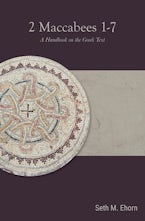Second Maccabees presents the reader with some of the most challenging Greek in the Septuagint. It is far more complex than almost all of the Greek of the New Testament and poses frequent difficulties that have given rise both to ancient textual variants and modern scholarly emendations in an attempt to make the Greek more intelligible. All who attempt to study 2 Maccabees in its original language will be grateful to Seth Ehorn for providing such a detailed analysis of the grammar and syntax as well as his consistently thorough treatment of the syntactical and textual problems. This two-part work will prove an invaluable vade mecum.
~David A. deSilva, Trustees’ Distinguished Professor of New Testament and Greek, Ashland Theological Seminary
It is a delight to see the first volume in the Baylor Handbook on the Septuagint series. Seth Ehorn has provided an exceptional guide to the reading of 2 Maccabees 1-7 that will be indispensable for anyone wishing to explore in depth the Greek grammar of the book. A rich introduction provides an overview of the literary structure, dating, and language features of this book and should be consulted by everyone working on 2 Maccabees. The translation and commentary provide an informed guide to the syntax and semantics of the Greek text, explaining in a clear and concise way any difficulties within the text. Students of Greek can now explore for themselves one of the more difficult Greek texts in the Septuagint.
~Jim K. Aitken, Reader in Hebrew and Early Jewish Studies, University of Cambridge
I look forward to using [this volume] in a classroom setting, where it will no doubt prove an invaluable resource. It will also be of use to scholars who wish to consult an up-to-date resource that addresses the linguistic particularities of Greek text and their relevance for text-critical issues. As such, it fulfills the aim of the series and represents a welcome and timely resource. The editors ought to be congratulated for a great start to the series.
~Jean Maurais, Review of Biblical Literature
This handbook is an excellent resource, providing readers with a means to access the language of 2 Maccabees. It is an encouraging sign that the LXX can be treated as an example of ancient Greek literature and has contributions to make towards our wider understanding of such work.
~Joseph Scales, Journal for the Study of the Old Testament
This volume is an excellent start of this series of Septuagint handbooks: it fully matches the aims of the series, as pointed out by the editors, it is fully up to date in its application of relevant resources and studies on 2 Maccabees, and it provides a wealth of information on grammatical and syntactical issues, which will be very helpful not only to graduate students, who may be the main target audience, but surely also to specialists in the field. Of course, this is not a study to read in one flow but a handbook in the traditional sense of the word, to be consulted time and again, each time one wants to study a passage of 2 Maccabees in Greek.
~Jan Willem Van Henten, Review of Biblical Literature
This volume makes for an auspicious beginning to another needed series focused on the original text of the bible.
~Timothy A. Brookins, Religious Studies Review
Ehorn’s careful analysis will be a valuable pedagogical aid to intermediate students of the Greek language and 2 Maccabees in particular. More than this, however, it will be an indispensable conversation partner even for advanced students and senior scholars in future engagements with this historically significant and challenging Greek text.
~Tyler J. Smith, Biblical Notes

